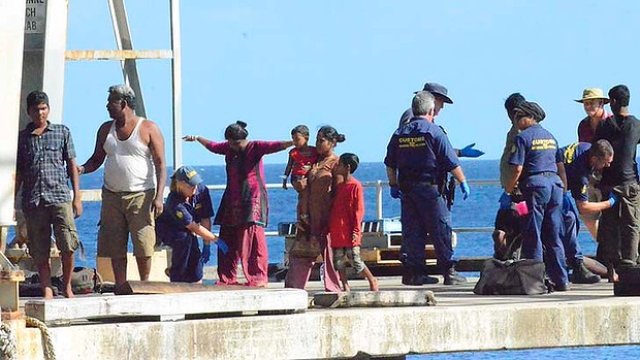
The “incommunicado detention without judicial scrutiny” of 153 Tamil asylum seekers has turned the world's eyes on Australia's refugee policy and brought many questions into the spotlight.
The first question was raised by 53 international law scholars from 17 Australian universities, who released a statement after the government revealed it had handed over 41 passengers of an asylum boat to the Sri Lankan navy.
This “clearly violates international law”, they said, and they were “profoundly concerned by reports that asylum seekers have been subjected to rapid and inadequate screening interviews at sea and returned to Sri Lanka”.
“Such summary procedures do not comply with minimum standards on refugee status determination under international law. Holding asylum seekers on boats in this manner also amounts to incommunicado detention without judicial scrutiny.”
The former Labor government introduced the “enhanced screening” process and used it to nullify the refugee claims of boat arrivals after one interview. A sole immigration agent could interview an asylum seeker almost immediately after arrival. Hundreds of asylum seekers have been sent back to Sri Lanka through this process.
Considering more than 90% of asylum seekers have consistently been found to have genuine refugee claims, the fact that “enhanced screening” has become standard practice should be cause for concern.
The second question raised is the fate of the 153 refugees now being held on a customs boat at a location the government refuses to reveal. After a judge of the High Court agreed to an injunction that prevented their handover to Sri Lanka, the full bench is due to hear the case within a month.
The conditions on the customs boat are unknown. Court proceedings did force the government to reveal that at least 21 of the asylum seekers were aged between two and 16. Refugee advocates have called for the asylum seekers to be released and allowed access to the UNHCR or to come to Australia.
There is also the question of Tamils in Sri Lanka, a widely persecuted and misrepresented minority. Views about the situation for Tamils range from that of Abbott's belief that the country is a “society at peace” to Tamil reporters describing it as “a structural, protracted genocide”.
TamilNet.com, a news services dedicated to accurate reporting on issues for Tamil people in Sri Lanka, says that systematic land grabs and continued militarism mean Tamils continue to suffer. It said Australia is “becoming directly responsible for the disappearances, torture and the slaying of the fleeing [Eelam] Tamils in the hands of the genocidal Sri Lankan state”.
Even as Morrison attended the inauguration of two customs boats Australia gave to the Sri Lankan government and reportedly tried to make a “secret” visit to the formerly Tamil-dominated northern province of Jaffna, the plight of Tamils continued to be ignored.
ABC news said on July 10 that Morrison only met with GA Chandrasiri, who, as a military general, led the Sri Lankan Army's assault on the Tamil self-determination struggle that culminated in the slaughter of more than 40,000 Tamils and the displacement of millions more. He retired after the war ended in May 2009 and was appointed governor of Northern Province.
The ABC said Morrison did not meet with the elected chief minister of the Northern Province, Tamil lawyer and judge CV Vigneshwaran, who won a landslide vote in the first election held in the province since 1988.
The High Court case will continue to shine a spotlight on Australia's increasingly unlawful actions and undermine its attempts at “operational secrecy”. Refugee advocate Ian Rintoul said: “The High Court action only happened because refugee advocates and Tamil community members managed to get the names and details of asylum seekers on the boat. The government’s culture of secrecy must be ended. The government’s attempt to undermine democratic rights goes hand in hand with its abuse of the rights of asylum seekers.”